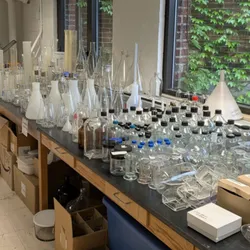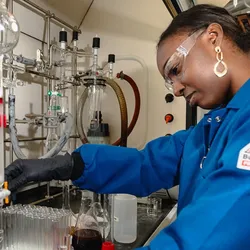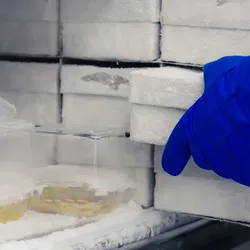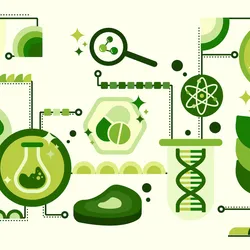This year, over 3,000 labs from around the world came together for the annual Freezer Challenge competition, organized by My Green Lab (MGL) and the International Institute for Sustainable Laboratories (I2SL). Focused on promoting energy efficiency in cold storage management, the challenge inspired teams to rethink their practices and gave new purpose to their sustainability efforts. Collectively, participants in the 2024 competition avoided 22,000 metric tons of carbon dioxide equivalent—an increase of more than 50 percent compared to last year’s challenge. This year’s winners represent a diverse group of labs and organizations whose commitment to sustainability led the way in this global effort, demonstrating the power of friendly competition and collaboration to drive impactful change.

Gothenburg Regional HBS Centre, AstraZeneca, Biotech/Pharma Lab Award 2024. In the photo (left to right): Anastasia Rudenko, Gabriela Baeza, Caroline Lööf, Josefin Aleke Fritzell, Ida Gidlöf, Agnes Andersson, Jenny Lönsjö, and Anna Sharp.
Photo provided by the Gothenburg Regional HBS Centre
The spirit of friendly competition
While many people are intrinsically motivated to adopt sustainable practices, extrinsic motivators—like friendly competition—can add a powerful layer, boosting enthusiasm, productivity, and performance. In the case of the Freezer Challenge, friendly rivalries and incentives brought excitement and a sense of community, sparking engagement and positive change.

Boston Children's Hospital, Hospital/Clinical Organization Award 2024.
Photo provided by the Boston Children's Hospital
At Boston Children's Hospital (BCH), which won a Clinical Organization Award, sustainability efforts were driven by a blend of educational initiatives and internal competition. In 2022, BCH simply encouraged labs to get involved. However, starting last year, they raised the stakes by awarding the winning lab a new -80°C freezer. In 2024, the top lab was treated to an ice cream and cookie social, which drove 37 labs to join—a marked increase from just eight labs in 2022. “Seeing this change and the enthusiasm that followed underscored the value of making sustainability relatable and actionable,” shared Chuck Blanchette, BCH’s research operations manager and green labs leader.

Labcorp Biorepository, Biotech/Pharma Biorepository Winning Streak Award 2024. In the photo (left to right): (Back) Samuel Rector, Joao Furin, Alex Melangton, Cameron Dowen, Shantell Coles, and Dion Grundy; (Middle) Christina Diaz, Dylan Robinson, Hanna Pitney, Kelsey Cameron, Kaitlyn Green, Lea Howard, and Matthew Kleemann; (Front) Jamshed Hasanzada, Cheresa Burge, Elizabeth Black, Simone Richards, Ashlee Thomas, Shevin Norfleet, and Chastity Kelley.
Photo provided by Labcorp Biorepository

National Institutes of Health, Government Winning Streak Award and Government Biorepository Award 2024. Participating labs pictured: (Upper image) Bethesda Campus; (Middle image) Research Triangle Park; (Lower image) Rocky Mountain Laboratories.
Photos provided by the National Institutes of Health
This enthusiasm was echoed by participants at Labcorp Biorepository, winner of a Biotech Biorepository Winning Streak Award. They found it helpful to appoint a global team lead who provided guidance and framed the challenge as an opportunity for fun and friendly competition. Travis Lyle, global director of biorepository services, noticed that this approach “increased team engagement [and led to] more labs wanting to join the challenge.” A similar story unfolded at the National Institutes of Health (NIH), which earned a Government Winning Streak Award and a Government Biorepository Award. There, weekly ‘Freezer Challenge Fridays’ emails helped foster a competitive spirit. In one notable instance, a coordinator’s passion propelled their institute’s participation rate to first place in just one day. “It was something never before seen at the NIH, which was equal parts amusing and impressive,” recalled Virgil Thornton, general engineer.
Despite being their first year participating, it didn’t take long for labs in the Smithsonian Tropical Research Institute in Panama, winner of a Government Organization Award, to fully embrace the Freezer Challenge. “We found that it really encouraged camaraderie between the participants,” explained Kristin Saltonstall, staff scientist. Motivated by their success, Saltonstall is already planning to organize an internal competition between facilities in the future to build on their momentum.

Smithsonian Tropical Research Institute, Panama, Government Organization Award 2024. In the photo (left to right): (Back) Kristin Saltonstall, Irving Bethancourt, and Felix Rodríguez; (Front) Isis Ochoa and María Fernanda Castillo. Not pictured: Raineldo Urriola and Plinio Gondola.
Photo provided by the Smithsonian Tropical Research Institute
The role of collective action
Laboratories are among the most energy-intensive facilities, with cold storage—including lab fridges, cold rooms, and freezers—accounting for a large portion of their consumption. While individual efforts are vital in addressing these environmental challenges, the scale of these issues calls for a unified approach. This year’s Freezer Challenge participants demonstrated that collaboration and shared responsibility can drive meaningful change, as evidenced by their record energy savings of 31.8 million kWh—the equivalent of the energy expended by 5,296 gas-powered cars in one year.
The Laboratory Medicine Unit at the University Hospital of Padova, recipient of a Clinical Lab Award, took on the challenge of identifying and organizing forgotten samples and boxes in their ultra-low temperature freezers. “Over time, freezers tend to accumulate samples that lose their relevance or ownership, leading to unnecessary energy consumption,” explained Paola Galozzi, researcher. As the lab team began this task, the project evolved. “Our team’s work . . . not only freed up valuable storage space but also became a powerful team-building exercise. It was a moment where everyone came together to tackle the challenge, reinforcing the idea that sustainability is a shared responsibility,” added Galozzi.

Laboratory Medicine “Green Team” from the University Hospital of Padova, Hospital/Clinical Lab Award 2024. In the photo (left to right): Dr. Laura Sciacovelli, Adriano Tasinato, Professor Daniela Basso, Dr. Paola Galozzi, and Lorenzo Baccarin.
Photo provided by the Laboratory Medicine Green Team
In the Drug Safety Testing Center at Hong Kong Science and Technology Parks Corporation, winner of a Government Lab Award, team members worked together to minimize unnecessary door openings and consolidate samples to reduce the number of active freezers. As a result, they not only reduced their energy usage but also strengthened their team dynamic, turning sustainability into a shared, ongoing commitment. “One of the most enjoyable moments was the collaborative spirit that developed among our team members,” shared Man Chow, assistant director. “The enthusiasm was infectious, and it was rewarding to see staff from different departments come together, share insights, and celebrate our collective progress.”
Sustainability initiatives often gain momentum when different departments work together, creating partnerships that allow for faster, more effective solutions. At Vertex Pharmaceuticals, which won a Pharmaceutical Lab Award, this collaborative approach has been central to the efforts of their Boston Research Green Team. Working alongside the facilities/operations team, which provided essential support for freezer evaluations and maintenance, the Green Team was able to implement several impactful initiatives. They established a shared inventory for their freezers and samples, installed a monitoring system for energy tracking, and coordinated regular freezer cleanouts and defrostings, optimizing their cold storage practices and enhancing cross-functional cooperation. Reflecting on their achievements, research scientists Julie Sesen and Rong Fan commented, “We see how much energy we can save from our daily efforts and how this will make [an] environmental impact. This proves protecting our planet is not a . . . mission that [is] unreachable.”

Boston Research, Biology, Freezer Challenge coordination team at Vertex Pharmaceuticals, Biotech/Pharma Lab Award 2024.
Photo provided by Boston Research
Beyond cold storage: Broader sustainability impacts
For many labs, the Freezer Challenge started as a way to improve cold storage practices. Yet, as participants embraced the challenge, they uncovered new opportunities for supporting broader sustainability goals, strengthening team dynamics, and fostering professional growth. What began as a friendly competition evolved into a catalyst, driving lasting changes that shaped lab culture and operations.

Quality Control Lab in Cotia, Brazil, AstraZeneca, Biotech/Pharma Winning Streak Award 2024.
Photo provided by the Quality Control Lab
A 2024 report by My Green Lab highlighted that Scope 3 emissions—indirect emissions across an organization’s value chain, including purchased goods and services—were over five times higher than direct emissions in biotech and pharma companies, posing a major challenge. For labs aiming to achieve carbon neutrality or net-zero goals, considering their supply chain and purchasing habits is essential. In the Central Laboratory of the Milwaukee Metropolitan Sewerage District, winner of a Government Lab Award, the Freezer Challenge sparked a closer look at these practices. “Instead of buying the newer version of what we already had or the cheapest option, we [are now taking the] time to investigate . . . energy usage and other sustainable features to make informed decisions,” noted Jessica Nanes, laboratory supervisor. This shift will ensure that environmental impact remains a priority in their decision-making process, embedding sustainability throughout the lab’s operations.

Dr. Elizabeth Jaffee GI Oncology Lab of Johns Hopkins University, Academic Lab Winning Streak Award 2024.
Photo provided by the Dr. Elizabeth Jaffee GI Oncology Lab
For some participants, the Freezer Challenge created opportunities to take on new roles and expand their skills. In the Dr. Elizabeth Jaffee GI Oncology Lab at Johns Hopkins University, which received an Academic Lab Winning Streak Award, research associate James Leatherman found that the challenge offered an unexpected opportunity to grow in his career and contribute to a larger vision of sustainability. “The trust that has been put in me, the opportunity to grow in my career . . . [and] the recognition that I can be a leader, a teacher, and offer something to this team that was lacking or overlooked before [has been one of the most rewarding aspects],” reflected Leatherman.

Bristol Myers Squibb Specimen Library, Biotech/Pharma Biorepository Award 2024. In the photo (left to right): Alexa Amiano, Ed Esguerra, Bank Balogun, Sara Abbasi, Celina Soto, Karl Kammerhoff, Charisma Majette, Avril Turlik, Tasha Gillis, Klarissa Jones, Janine Love, Deidra Lewis, Ta’Naya Hickson, and Nancy Elhalaby.
Photo provided by the Bristol Myers Squibb Specimen Library
Adopting sustainability initiatives in large organizations often involves navigating complex layers of decision-making and demonstrating measurable impact to gain leadership buy-in. For BCH, the Freezer Challenge helped build the momentum needed to advance their sustainability efforts. “Winning the [Organization Award in the hospital/clinical sector] three years in a row has provided a tangible demonstration of energy and cost savings, helping BCH Green labs secure more visibility and support from stakeholders,” shared Blanchette.

The Paris Brain Institute, Cell Culture Facility (ICV-3C), Academic Biorepository Award 2024. In the photo (left to right): Siham Kerboua, Océane Ribault, Manon Lamontagne, Laetitia Strehl, and Jérôme Van Wassenhove.
Photo provided by The Paris Brain Institute
The Freezer Challenge also acted as a springboard for additional sustainability initiatives, prompting labs to reevaluate their everyday operations. For Chow and his team, the award inspired them to explore projects like reducing plastic consumables, optimizing resource use, and promoting energy-efficient practices. “The challenge has become a catalyst for ongoing discussions about sustainability, leading us to integrate these values more deeply into our daily operations and long-term goals,” explained Chow. The momentum from the challenge also inspired Galozzi and her team to expand their sustainability efforts. “The energy-saving actions implemented during the challenge have since been extended to other aspects of our daily operations. This includes improvements in how we manage laboratory resources, such as reducing unnecessary paper use and refining our approach to energy efficiency,” shared Galozzi. “Our laboratory’s commitment to sustainability is now firmly embedded in our everyday practices, and we hope that our efforts will inspire other laboratories and institutions to take similar actions.”

Genetica Medica, SYNLAB Italia, Hospital/Clinical Medium Lab Award 2024. In the photo (left to right): Emilio Vicari, Fabiana Cro’, Mauro Colantonio, Nicola Chiarelli, and Lara Walczer Baldinazzo.
Photo provided by Genetica Medica
The 2024 Freezer Challenge emphasized how friendly competition can turn sustainability into an engaging and impactful effort. Through collective action and a shared commitment to environmental responsibility, participants optimized cold storage and made meaningful progress toward their broader sustainability goals. As these labs continue to build on their achievements, the Freezer Challenge serves as a reminder that together, we can make significant strides toward a sustainable future.
Ready to join the Freezer Challenge? Sign up here to be the first to know when the 2025 competition launches!
The Freezer Challenge is a joint program run by My Green Lab and the International Institute for Sustainable Laboratories (I2SL) and is made possible through the generosity of our industry sponsors. Our sponsors for the 2024 competition are Eppendorf, Amgen, Bristol Myers Squibb, Sanofi, Gilead, Thermo Fisher Scientific, Elemental Machines, and PHCbi.

University of Illinois Urbana-Champaign, Academic Organization Award 2024.
Photo provided by the University of Illinois Urbana-Champaign





















